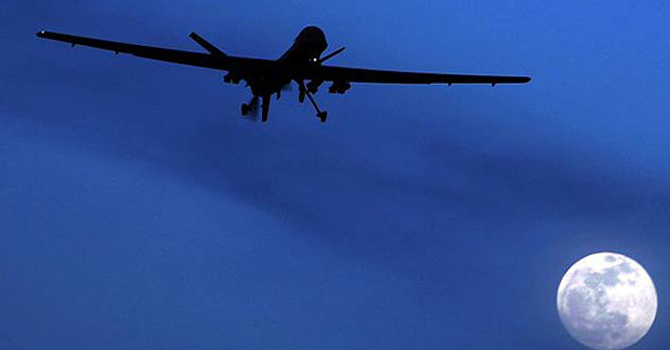
WASHINGTON: The Obama administration's increasing use of unmanned drone strikes to kill terror suspects is widely opposed around the world, according to a Pew Research Center survey on the US image abroad.
In 17 out of 21 countries surveyed, more than half of the people disapproved of US drone attacks targeting extremist leaders and groups in nations such as Pakistan, Yemen and Somalia, Pew said Wednesday.
But in the United States, a majority, or 62 per cent, approved the drone campaign, making American public opinion the clear exception.
''There remains a widespread perception that the US acts unilaterally and does not consider the interests of other countries,'' the study authors said, especially in predominantly Muslim nations, where American anti-terrorism efforts are ''still widely unpopular.''
The White House declined to comment on the report. The Obama administration considers drone strikes one of its most effective tools to combat al Qaeda—preferable to conventional war because the strikes produce fewer American casualties and are intended to be more palatable abroad because the use of drones keeps US troops on the ground to a minimum.
''In order to prevent terrorist attacks on the United States and to save American lives, the United States government conducts targeted strikes against specific al Qaeda terrorists, sometimes using remotely piloted aircraft, often referred to publicly as drones,'' White House counter-terrorism chief John Brennan said in April in a detailed and wide-ranging defense of the policy.
He said targets are chosen by weighing whether there is a way to capture the person against how much of a threat the person presents to Americans.
The global drone campaign under President Barack Obama has killed a number of high-value leaders, arguably more than any other method including more than a decade of special operations raids inside Afghanistan. A strike in Pakistan this month killed al Qaeda's most recent second in command, Abu Yahya al-Libi.
As conventional US forces draw down from their missions overseas and drone strikes ramp up, the ire directed at invading armies is being transferred to the unmanned aerial devices.
''We continue to see the public thinking Obama has not fulfilled his promise that he would seek international approval for military force, and that's related to displeasure with the drone strikes,'' Pew Research Centre President Andrew Kohut said Tuesday in advance of the release of the survey, titled ''Global Opinion of Obama Slips, International Policies Faulted.''
This is the first year Pew has included a question about the use of drones in its survey on the Obama administration, Kohut said. ''It's now a global issue,'' he said.
The polls were nationally representative surveys conducted by telephone or in-person interviews in 21 countries in March and April. In Pakistan, CIA drone strikes have targeted terrorist suspects for years, with the Pakistani government publicly condemning them but privately continuing to work with US intelligence on joint counter-terrorist operations.
That changed after the US Navy Seal raid that killed Osama bin Laden inside Pakistan last year—carried out without Pakistani permission or knowledge. Pakistan considered that a violation of its sovereignty and has demanded the US either end the drone program or give Pakistan control of the aircraft, something US officials say they will not do.
After a lull in strikes as the US and Pakistan tried to mend fences, strikes have picked up again in recent weeks because US officials believe they have nothing to gain diplomatically with the Pakistanis by holding back, according to two US officials who spoke on condition of anonymity to describe highly charged strategic negotiations.
In Yemen, both military and CIA drones have stepped up the campaign against al Qaeda's branch there, considered the most deadly threat to US interests. Those strikes are carried out in coordination with Yemeni officials, with Yemenis signing off on the targets, Yemeni and US officials say.
In Somalia, drones are used less frequently. With no formal government in the war-torn, failed state, there is no one for the US to ask permission, but officials have been careful to keep both CIA and military strikes focused on suspects considered to be high-value targets, rather than targeting large training camps where dozens of would-be militants are learning their trade.
The idea is to remove the leaders rather than killing large numbers of trainees and pulling their extended families into battle of revenge against the Americans.













































Dear visitor, the comments section is undergoing an overhaul and will return soon.